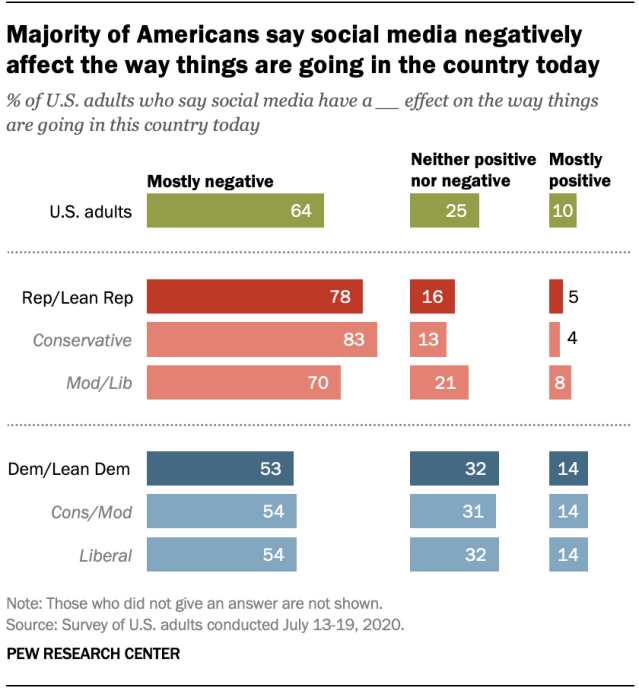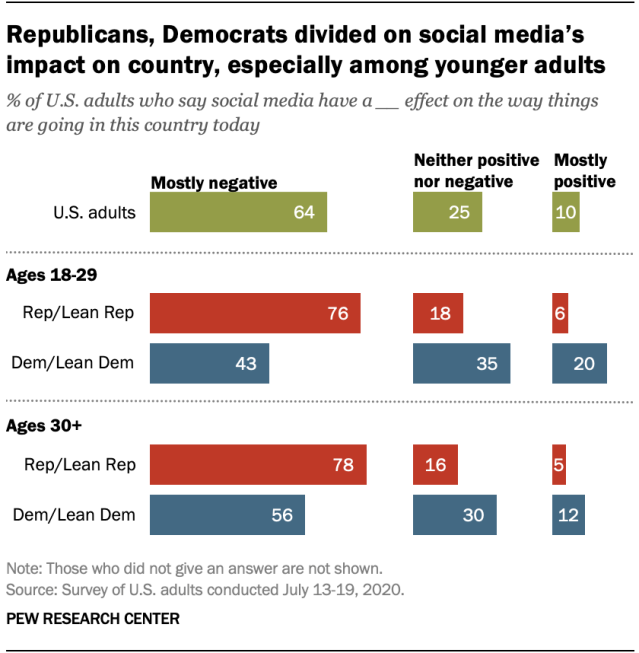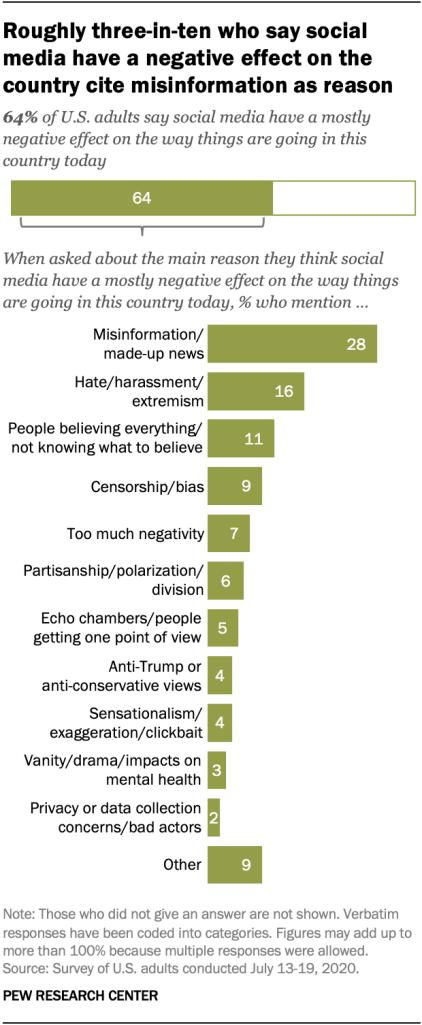About two-thirds of Americans (64%) say social media have a mostly negative effect on the way things are going in the country today, according to a Pew Research Center survey of U.S. adults conducted July 13-19, 2020. Just one-in-ten Americans say social media sites have a mostly positive effect on the way things are going, and one-quarter say these platforms have a neither positive nor negative effect.
Those who have a negative view of the impact of social media mention, in particular, misinformation and the hate and harassment they see on social media. They also have concerns about users believing everything they see or read – or not being sure about what to believe. Additionally, they bemoan social media’s role in fomenting partisanship and polarization, the creation of echo chambers, and the perception that these platforms oppose President Donald Trump and conservatives.
This is part of a series of posts on Americans’ experiences with and attitudes about the role of social media in politics today. Pew Research Center conducted this study to understand how Americans think about the impact of social media on the way things are currently going in the country. To explore this, we surveyed 10,211 U.S. adults from July 13 to 19, 2020. Everyone who took part is a member of the Center’s American Trends Panel (ATP), an online survey panel that is recruited through national, random sampling of residential addresses. This way nearly all U.S. adults have a chance of selection. The survey is weighted to be representative of the U.S. adult population by gender, race, ethnicity, partisan affiliation, education and other categories. Read more about the ATP’s methodology.
Here are the questions used for this report, along with responses, and its methodology.
The public’s views on the positive and negative effect of social media vary widely by political affiliation and ideology. Across parties, larger shares describe social media’s impact as mostly negative rather than mostly positive, but this belief is particularly widespread among Republicans.
Roughly half of Democrats and independents who lean toward the Democratic Party (53%) say social media have a largely negative effect on the way things are going in the country today, compared with 78% of Republicans and leaners who say the same. Democrats are about three times as likely as Republicans to say these sites have a mostly positive impact (14% vs. 5%) and twice as likely to say social media have neither a positive nor negative effect (32% vs. 16%).
Among Democrats, there are no differences in these views along ideological lines. Republicans, however, are slightly more divided by ideology. Conservative Republicans are more likely than moderate to liberal Republicans to say social media have a mostly negative effect (83% vs. 70%). Conversely, moderate to liberal Republicans are more likely than their conservative counterparts to say social media have a mostly positive (8% vs. 4%) or neutral impact (21% vs. 13%).
Younger adults are more likely to say social media have a positive impact on the way things are going in the country and are less likely to believe social media sites have a negative impact compared with older Americans. For instance, 15% of those ages 18 to 29 say social media have a mostly positive effect on the way things are going in the country today, while just 8% of those over age 30 say the same. Americans 18 to 29 are also less likely than those 30 and older to say social media have a mostly negative impact (54% vs. 67%).
However, views among younger adults vary widely by partisanship. For example, 43% of Democrats ages 18 to 29 say social media have a mostly negative effect on the way things are going, compared with about three-quarters (76%) of Republicans in the same age group. In addition, these youngest Democrats are more likely than their Republican counterparts to say social media platforms have a mostly positive (20% vs. 6%) or neither a positive nor negative effect (35% vs. 18%) on the way things are going in the country today. This partisan division persists among those 30 and older, but most of the gaps are smaller than those seen within the younger cohort.
Views on the negative impact of social media vary only slightly between social media users (63%) and non-users (69%), with non-users being slightly more likely to say these sites have a negative impact. However, among social media users, those who say some or a lot of what they see on social media is related to politics are more likely than those who say a little or none of what they see on these sites is related to politics to think social media platforms have a mostly negative effect on the way things are going in the country today (65% vs. 50%).
Past Pew Research Center studies have drawn attention to the complicated relationships Americans have with social media. In 2019, a Center survey found that 72% of U.S. adults reported using at least one social media site. And while these platforms have been used for political and social activism and engagement, they also raise concerns among portions of the population. Some think political ads on these sites are unacceptable, and many object to the way social media platforms have been weaponized to spread made-up news and engender online harassment. At the same time, a share of users credit something they saw on social media with changing their views about a political or social issue. And growing shares of Americans who use these sites also report feeling worn out by political posts and discussions on social media.
Those who say social media have negative impact cite concerns about misinformation, hate, censorship; those who see positive impact cite being informed
When asked to elaborate on the main reason why they think social media have a mostly negative effect on the way things are going in this country today, roughly three-in-ten (28%) respondents who hold that view mention the spreading of misinformation and made-up news. Smaller shares reference examples of hate, harassment, conflict and extremism (16%) as a main reason, and 11% mention a perceived lack of critical thinking skills among many users – voicing concern about people who use these sites believing everything they see or read or being unsure about what to believe.
In written responses that mention misinformation or made-up news, a portion of adults often include references to the spread, speed and amount of false information available on these platforms. (Responses are lightly edited for spelling, style and readability.) For example:
“They allow for the rampant spread of misinformation.” –Man, 36
“False information is spread at lightning speed – and false information never seems to go away.” –Woman, 71
“Social media is rampant with misinformation both about the coronavirus and political and social issues, and the social media organizations do not do enough to combat this.” –Woman, 26
“Too much misinformation and lies are promoted from unsubstantiated sources that lead people to disregard vetted and expert information.” –Woman, 64
People’s responses that centered around hate, harassment, conflict or extremism in some way often mention concerns that social media contributes to incivility online tied to anonymity, the spreading of hate-filled ideas or conspiracies, or the incitement of violence.
“People say incendiary, stupid and thoughtless things online with the perception of anonymity that they would never say to someone else in person.” –Man, 53
“Promotes hate and extreme views and in some cases violence.” –Man, 69
“People don’t respect others’ opinions. They take it personally and try to fight with the other group. You can’t share your own thoughts on controversial topics without fearing someone will try to hurt you or your family.” –Woman, 65
“Social media is where people go to say some of the most hateful things they can imagine.” –Man, 46
About one-in-ten responses talk about how people on social media can be easily confused and believe everything they see or read or are not sure about what to believe.
“People believe everything they see and don’t verify its accuracy.” –Man, 75
“Many people can’t distinguish between real and fake news and information and share it without doing proper research …” –Man, 32
“You don’t know what’s fake or real.” –Man, 49
“It is hard to discern truth.” –Woman, 80
“People cannot distinguish fact from opinion, nor can they critically evaluate sources. They tend to believe everything they read, and when they see contradictory information (particularly propaganda), they shut down and don’t appear to trust any information.” –Man, 42
Smaller shares complain that the platforms censor content or allow material that is biased (9%), too negative (7%) or too steeped in partisanship and division (6%).
“Social media is censoring views that are different than theirs. There is no longer freedom of speech.” –Woman, 42
“It creates more divide between people with different viewpoints.” –Man, 37
“Focus is on negativity and encouraging angry behavior rather than doing something to help people and make the world better.” –Woman, 66
Far fewer Americans – 10% – say they believe social media has a mostly positive effect on the way things are going in the country today. When those who hold these positive views were asked about the main reason why they thought this, one-quarter say these sites help people stay informed and aware (25%) and about one-in-ten say they allow for communication, connection and community-building (12%).
“We are now aware of what’s happening around the world due to the social media outlet.” –Woman, 28
“It brings awareness to important issues that affect all Americans.” –Man, 60
“It brings people together; folks can see that there are others who share the same/similar experience, which is really important, especially when so many of us are isolated.” –Woman, 36
“Helps people stay connected and share experiences. I also get advice and recommendations via social media.” –Man, 32
“It keeps people connected who might feel lonely and alone if there did not have social media …” – Man, 65
Smaller shares tout social media as a place where marginalized people and groups have a voice (8%) and as a venue for activism and social movements (7%).
“Spreading activism and info and inspiring participation in Black Lives Matter.” –Woman, 31
“It gives average people an opportunity to voice and share their opinions.” –Man, 67
“Visibility – it has democratized access and provided platforms for voices who have been and continue to be oppressed.” –Woman, 27
Note: This is part of a series of blog posts leading up to the 2020 presidential election that explores the role of social media in politics today. Here are the questions used for this report, along with responses, and its methodology.
Other posts in this series:
"social" - Google News
October 16, 2020 at 01:11AM
https://ift.tt/350T3q7
64% of Americans say social media have a mostly negative effect on the way things are going in the U.S. today - Pew Research Center
"social" - Google News
https://ift.tt/38fmaXp
https://ift.tt/2WhuDnP
Bagikan Berita Ini


















0 Response to "64% of Americans say social media have a mostly negative effect on the way things are going in the U.S. today - Pew Research Center"
Post a Comment